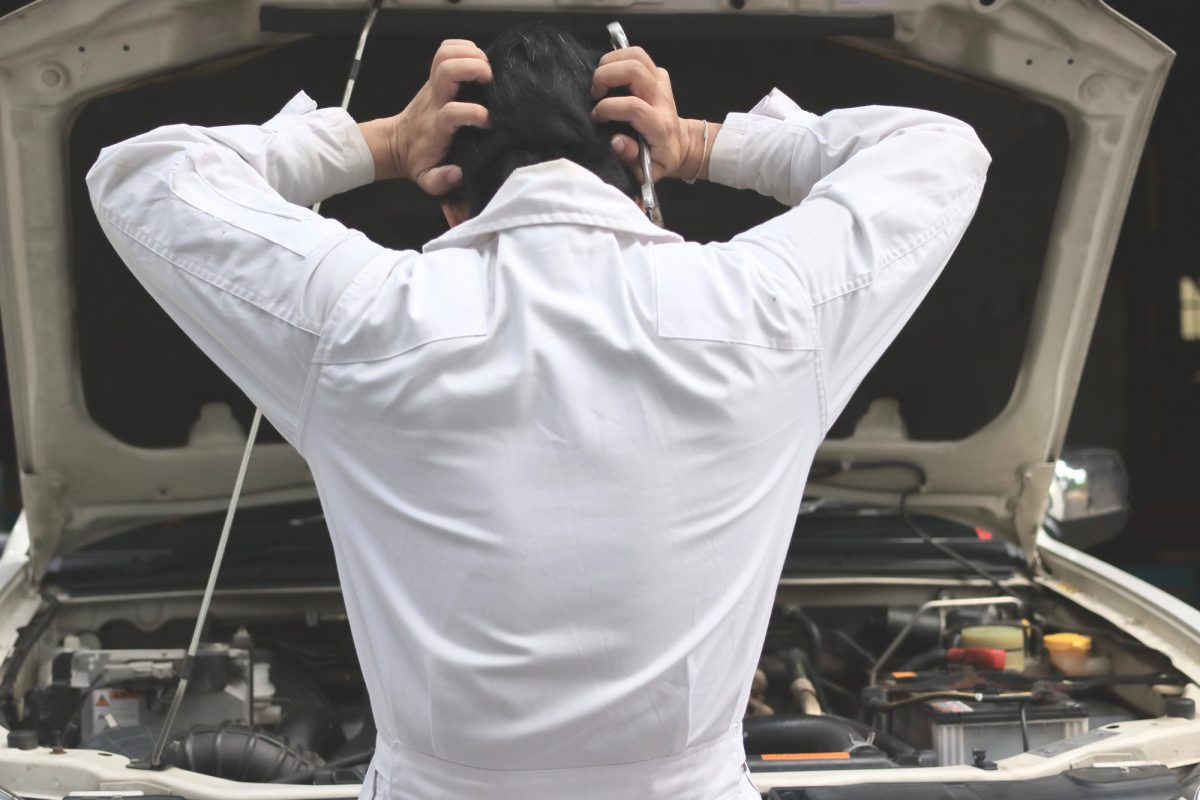When your car starts to vibrate unexpectedly, it might be easy to dismiss it as a minor nuisance. Many drivers grow accustomed to these subtle shakes and shudders, thinking they’re just part of the driving experience. However, these vibrations often signal deeper mechanical issues that could spiral into major problems if left unchecked. Recognizing the causes behind these movements can save you from costly repairs and potential safety hazards. Here are 12 car vibrations that may seem harmless at first, but could lead to serious trouble if ignored.
Steering Wheel Vibration at Highway Speeds

If your steering wheel starts to shake while driving on the highway, it’s often a sign of wheel imbalance or alignment issues. Continued driving without addressing it can lead to uneven tire wear, poor fuel efficiency, and compromised handling. This seemingly small issue could snowball into a dangerous situation at high speeds.
Vibration During Braking

A pulsating or shaking feeling when you apply the brakes usually indicates warped rotors or worn brake components. This not only affects your car’s stopping power but also puts unnecessary stress on the suspension system. Letting it persist can reduce braking effectiveness and raise the risk of collisions.
Engine Vibration While Idling

If your car shakes while idling, it’s usually a sign of engine misfires, faulty spark plugs, or a damaged motor mount. Misfires disrupt the engine’s smooth operation and can reduce fuel efficiency, while worn motor mounts can cause additional engine strain. Left untreated, this can cause lasting damage to the engine or other vital components.
Shaking That Increases with Speed

A vibration that worsens as you go faster often indicates issues with wheel alignment, wheel balancing, or bent rims. As speed increases, these problems become more pronounced and can affect your ability to steer correctly, making the car harder to control. Ignoring this problem can further damage your suspension and result in costly repairs.
Related: 10 Motorcycle Mods That Will Instantly Elevate Your Ride
Vibrating Seat Sensation

Feeling vibrations directly through the seat could point to problems in the rear wheels or tires, such as uneven wear or misalignment. Rear-end issues can often go unnoticed but can cause imbalanced driving dynamics that affect your car’s overall performance. Left unchecked, this could lead to more significant suspension damage and increased tire wear.
Related: These 15 Common Motorcycle Mistakes Could Cost You Your Life
Vibration After Cold Starts

A car that shakes or vibrates only after a cold start could be experiencing issues with its spark plugs, air intake, or fuel system. Cold temperatures affect the way fuel is burned in the engine, and worn spark plugs or clogged fuel injectors can lead to misfires and rough idling. Over time, neglecting this problem can decrease fuel efficiency and damage internal engine components.
Related: 12 Motorcycle Insurance Hacks To Save You Hundreds Every Year
Vibration Linked to Engine RPM

If the vibrations in your car increase with the engine’s RPM, the cause could be faulty ignition coils or misfiring cylinders. These components are essential for the proper combustion process, and their failure can cause the engine to shake as it struggles to power the vehicle. Ignoring this can lead to severe engine damage and a significant reduction in overall performance.
Related: These 10 Custom Motorcycles Will Make You Rethink Your Ride
Shaking with a Burning Smell

A vibration accompanied by a burning smell is often caused by clutch slippage or overheating transmission fluid. Both of these issues stem from friction in the drivetrain and can result in further mechanical damage if ignored. Fast intervention is necessary to avoid catastrophic failure of the clutch or transmission, which would require costly repairs or replacement.
Related: 15 Motorcycle Myths You’ve Been Lied To About For Years
Vibration From the Pedals

Feeling vibrations through the brake or accelerator pedals could be a result of worn brake rotors or an issue with the transmission system. Brake rotors can become warped over time, causing a pulsating sensation through the pedal when applied. Ignoring this vibration can lead to a reduction in braking effectiveness, putting you at risk of an accident or a more costly repair down the line.
Related: The Most Breathtaking Motorcycle Routes In America You Need To Ride
Shaking with a Clicking Noise

A vibration that is accompanied by a clicking noise is a sure sign of a failing CV joint or damaged axle shaft. These components are crucial for maintaining smooth power transfer from the engine to the wheels, and any malfunction can severely affect your car’s ability to drive smoothly. If not addressed immediately, the damage can spread to other parts of the drivetrain, leading to a costly repair.
Related: The Pricey Mistakes Buyers Keep Making With New vs. Used Motorcycles
Strange Vibrations in Reverse

If your vehicle shakes only when reversing, the issue may lie in the transmission mount or differential. These components are vital for smooth gear engagement and power distribution. Delaying repairs could cause permanent transmission damage or poor gear control.
Related: 12 Red Flags Your Motorcycle Needs Repairs ASAP
Vibration with Check Engine Light

If a vibration occurs alongside an illuminated check engine light, it’s a strong sign of an underlying engine or emission system problem. This could range from misfires to faulty sensors, both of which can harm the vehicle’s performance. The light is your warning to take the issue seriously before it escalates.
Related: Spring Riding Hacks Every Biker Needs For A Fun Trip
Not all car vibrations are created equal, and some can hide more serious issues beneath the surface. While it’s easy to get used to small shakes and ignore them, doing so can put both your safety and wallet at risk. A little investigation today can prevent major mechanical failures tomorrow. By understanding what your car is trying to tell you, you’re better equipped to keep it running smoothly for years to come. Don’t ignore the shake, treat it as your car’s early warning system.
Disclaimer: This list is solely the author’s opinion based on research and publicly available information.
12 Car Repairs Mechanics Don’t Want You to Know

Maintaining your car doesn’t have to be intimidating or expensive. With just a few basic tools and a little know how, you can handle a surprising amount of car maintenance yourself. Whether it’s changing fluids, checking tire pressure, or replacing filters, these simple DIY tasks can keep your car running smoothly and save you money. Here are 13 maintenance tips that even total beginners can manage!
Read it here: 12 Car Repairs Mechanics Don’t Want You to Know
15 Insanely Complicated Cars That Mechanics Avoid

Some cars are known for their exceptional engineering, but that doesn’t always translate to easy maintenance. Certain models come with intricate technology, unusual designs, or parts that require specialized tools and knowledge, making mechanics think twice before working on them. These vehicles often lead to frustration, extended repair times, and sky-high service bills, making even the most experienced professionals avoid them.
Read it here: 15 Insanely Complicated Cars That Mechanics Avoid
Mechanic-Approved! 12 Expert Answers to Your Car Problems

Keeping your car in top shape means understanding common issues and how to fix them. Whether it’s strange noises, warning lights, or performance problems, knowing what’s wrong can save you time and money. Here are 12 expert-approved answers to some of the most frequent car questions.
Read it here: Mechanic-Approved! 12 Expert Answers to Your Car Problems
You’ll love these related posts:


